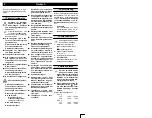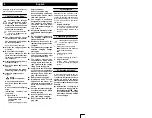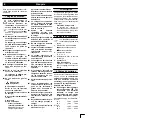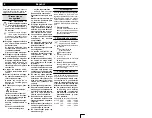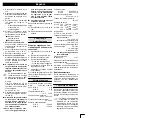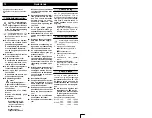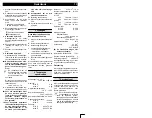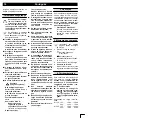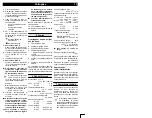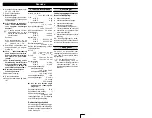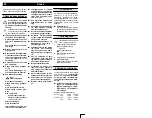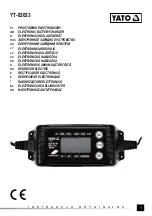
5
English
Recommended charging capacity:
W 15 E
12 V:
12 Ah ... 150 Ah
24 V:
12 Ah ... 75 Ah
W 20 E
12 V:
12 Ah ... 180 Ah
24 V:
12 Ah ... 90 Ah
1.
Pull out the mains plug.
2.
Unscrew the inspection plugs of
standard batteries before bat-
tery charging.
3.
Securely connect the charging
clips to the battery, ensuring that
the polarity is correct:
– red clip to positive terminal
– black clip to negative terminal
4.
Set the selector switch (1) to the
correct battery type:
Maintenance-free batteries
Standard batteries
5.
Only for W 20 E:
Set the control knob (4) to the
left-hand limit position (mini-
mum charging current).
6.
Set voltage selector switch (2) to
position „12 V” or „24 V”.
7.
Insert mains plug.
8.
Only for W 20 E:
Set the charging current to the
value specified by the battery
manufacturer at the control
knob (4).
The instructions of the bat-
tery manufacturer must be
observed in all cases when
setting the charging current.
In this operating mode the
charging current should not
be greater than 20% of the bat-
tery capacity (Ah).
Example:
In this operating mode a maxi-
mum charging current of
36 Ah x 0.2 /h
7 A
is required for an 36 Ah battery
9.
Continuously monitor the char-
ging current on the
ammeter (3).
The battery must be checked
before trickle charging. Only
fault-free batteries must be
charged further or trickle-
charged!
10. Set the operating mode selec-
tor switch (1) to the position
for maintenance-free batte-
ries
for further charging,
trickle charging or floating
operation of the battery.
Check the battery condition
every three months.
After the end of charging:
11. Pull out the mains plug.
12. Remove the charging clips from
the battery.
5 Faults
Charger does not
function after switching on:
1.
Pull out the mains plug.
2.
Check the mains connection.
3.
Check the mains fuse:
1.
Check polarity:
– Red clip to positive terminal
– Black clip to negative terminal
2.
Check that the charging clips
are securely attached.
3.
Check the rated battery voltage.
The charger must be checked by the
after-sales service if it still does not
function.
6 Technical data
Dimensions L x W x H:
140 x 265 x 180 mm
Weight:
W 15 E
5 kg
W 20 E
6 kg
Ambient temperature:
–10
C ... +40
C
Rated mains voltage:
230 V +6%/–10%
Rated mains frequency: 50...60 Hz
Power consumption:
W 15 E
230 VA
W 20 E
330 VA
Mains fuse:
W 15 E H250 slow-blow 2,0 A
W 20 E H250 slow-blow 3,15A
Mains connection cable:
0,75 mm
2
/ 1,8 m
Rated battery voltage:
12/24 V
Charging current:
W 15 E
12 V
10 A
arithm.
/ 15 A
eff.
24 V
5,0 A
arithm.
/ 7,5 A
eff.
W 20 E
12 V
15 A
arithm.
/ 20 A
eff.
24 V
7,5 A
arithm.
/ 10 A
eff.
Ammeter
W 15 E
0...20 A
W 20 E
0...30 A
Final charging voltages:
Standard batteries
14.4 V or 28.8 V
Maintenance-free batteries
13.8 V or 27.6 V
Charging characteristic:
IWU
Charging leads
2.5 mm
2
/ 1.4 m / PVC
The charging leads must not
be changed!
Degree of protection(DIN 40050):
IP 21
Safety class (DIN 40530):
II
RFI suppression
to VDE 0875
Switch-on prevention in the event of
short-circuit or incorrect polarity
Radio interference
suppression
It is herewith certified that chargers
W15E and W20E are provided with
a radio interference suppressor in
compliance with the regulations of
EN 55014.
7 After-sales service
Please contact an after-sales ser-
vice center for Bosch products if
spare parts or after-sales services
are required.
The list of Bosch wholesa-
lers in Germany, Bosch sub-
sidiaries abroad and foreign
agents is provided on the last
few pages of the operating
instructions.


